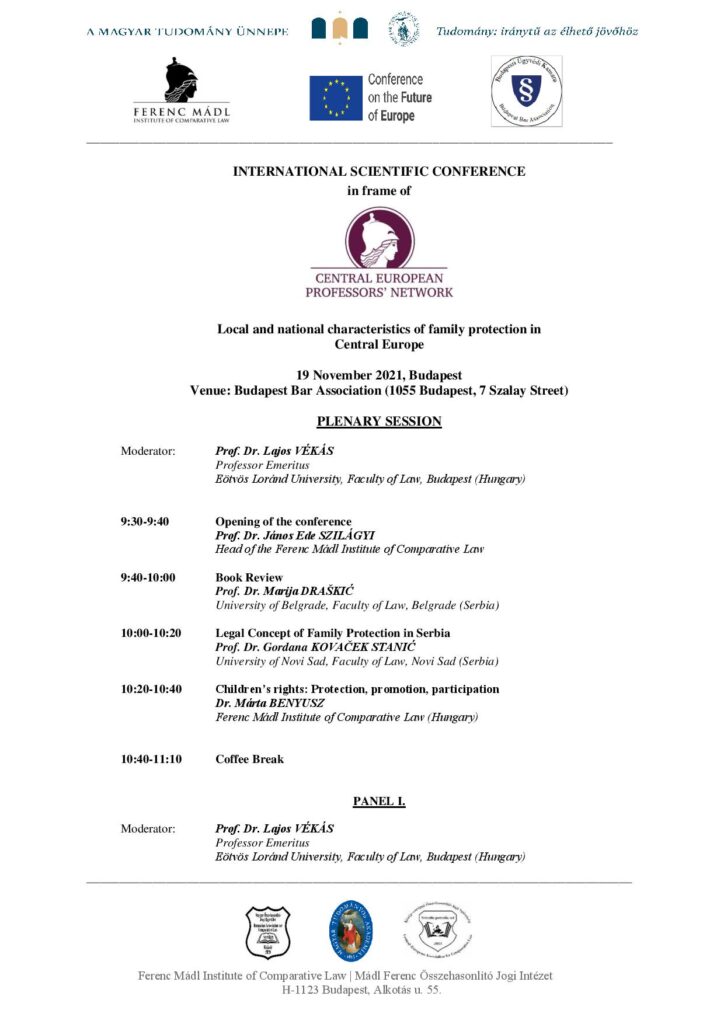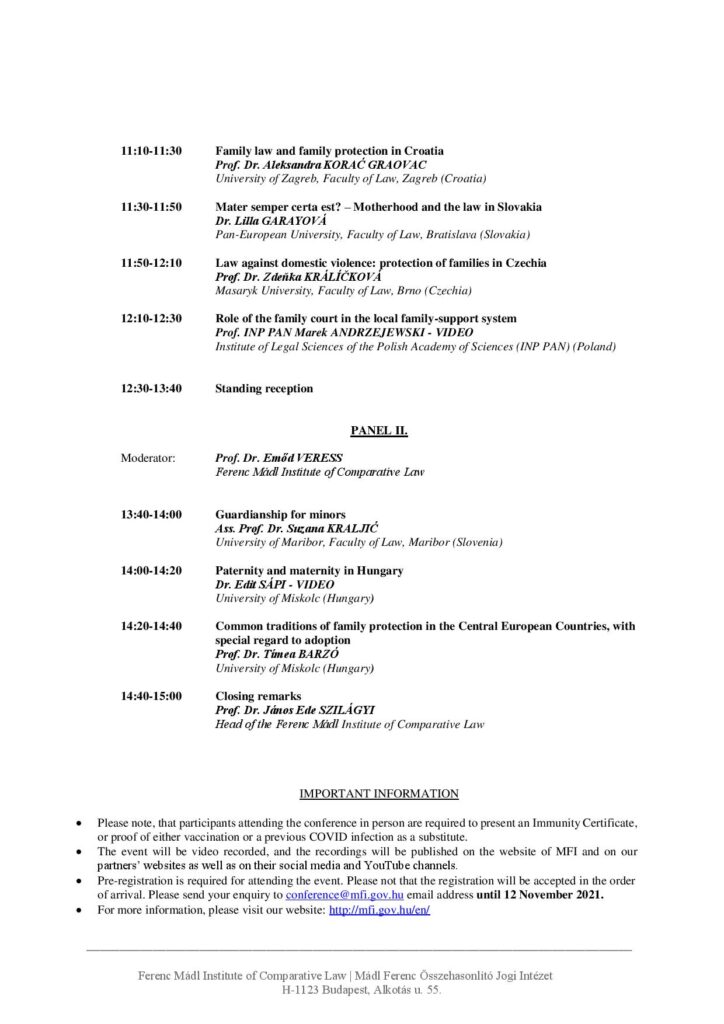The Central European Professors’ Network, consisting of four research groups, launched its activities on 1 January 2021 to conduct research on a great variety of issues with regard to seven Central European countries (Hungary, Poland, Czech Republic, Croatia, Slovakia, Slovenia, Serbia). The Professors’ Network organises events with the primary aim to draw attention of the European citizens to the topics which are important and significant in connection with the future of Europe, in particular of Central Europe.
One of the research groups has dealt with the impact of the enforcement of family rights and family protection. Furthermore, the group has focused on the non-legal and legal instruments of social and state protection of marriage and the family in field of domestic and international law. It analysises the definition of ‘family’ and the specific normative levels of ‘family definition’ in the national law; the legally recognised forms of kin family relationships; the legal framework of parent-child relationships; and the differences between the rights of children born out of marriage and children born out of wedlock.
The conference on the above issue will also function as a book launch of the „Family Protection From a Legal Perspective – Analysis on Certain Central European Countries” written by the members of the research group. Therefore, besides the conference presentations, the comparative legal book will also be presented as the main achievement of the research team. This book is a gap-filling contribution in the field of comparative constitutional law and a publication which sheds light on the most important Central European aspects of the issue.
The main organisers of the event are the Ferenc Mádl Institute of Comparative Law, the Hungarian Association for Comparative Law and the Central-European Association for Comparative Law.
Summary Report on the International Scientific Conference
On November 19, 2021, a conference entitled “Local and international characteristics of family protection in Central Europe” was held in the Ceremonial Hall of the Budapest Bar Association within the framework of the Central and Eastern European Professors Network of the Ferenc Mádl Institute of Comparative Law. The Hungarian Academy of Sciences and the Central European Comparative Law Association also took part in the organization of the event.
The moderator of the first part was Lajos Vékás, academician, professor emeritus of the Faculty of Law of the Eötvös Lóránd University. The event was organized because of a recently published book entitled “Family protection from a legal perspective – Analysis on certain Central European Countries”.
The conference was opened by János Ede Szilágyi, professor, head of the Ferenc Mádl Institute of Comparative Law (MFI) who talked about the achievements of the Professors’ Network so far.
The next speaker, Marija Draskic, a professor at the Faculty of Law at the University of Belgrade, presented the newly published book.
The next speaker, Gordana Kovacek Stanic, a professor at the Faculty of Law at the University of Novi Sad, gave a presentation on how the legal protection of families is implemented in Serbia.[1]
The last speaker of the first panel was Márta Benyusz, head of the department of the Ferenc Mádl Institute of Comparative Law, who spoke about the 3P (protection, promotion, participation) model to be applied in the protection of children’s rights and the role of non-governmental organizations in this process.[2]
The first speaker after the coffee break was Aleksandra Korac Graovac, a professor at the Faculty of Law at the University of Zagreb. Title of her presentation: ‘Family Law and Family Protection in Croatia’.
Lilla Garayová from the Faculty of Law of the Pan-European University of Bratislava reviewed the Slovak and international legal regulations on maternity. The title of her presentation was: ‘Mater semper certa est? Motherhood and the law in Slovakia’. She talked mainly about surrogacy, which is a highly debated and not properly regulated issue across Europe.
The next speaker, Zdenska Kralickova, a professor at the Faculty of Law at Masaryk University in Brno, gave an insight into the topic of domestic violence and its regulation in Czechia.[3]
The last presentation of the morning program took place via a projector. Marek Andrzejewski Professor at the Institute of Law of the Polish Academy of Sciences. The title of his lecture was: ‘The role of family law courts in the local family support system’.
The afternoon session was moderated by Emőd Veress, Head of the Ferenc Mádl Institute of Comparative Law. The first speaker was Suzana Kraljic, an associate professor at the Faculty of Law at the University of Maribor, who spoke about guardianship, also via internet.[4]
Edit Sápi, an assistant professor at the Faculty of Law of the University of Miskolc, gave a lecture on the Hungarian rules of the formation of paternal and maternal status.[5]
The last speaker, Tímea Barzó, a professor at the Faculty of Law of the University of Miskolc, focused on the issue of adoption, and its Hungarian and international rules.[6]
The concluding thoughts were formulated by János Ede Szilágyi: he thanked the speakers, the participants and the organizers for their work, and handed over a diploma of merit to the speakers who were present at the conference.
The conference was attended in person and online by lecturers and students of Hungarian and foreign universities, researchers, and professors of the Professors’ Network.
An important message of the conference was that the countries of Central and Eastern Europe all share a similar set of values, in which the support and protection of families has a prominent role and significance.
[1] ’Legal concept of family protection in Serbia’
[2] ’Children’s rights: protection, promotion, participation’
[3] ’Law against domestic violence: protection of families in Czechia’
[4] ’Guardianship for adults’
[5] ’Paternity and maternity in Hungary’
[6] ’Common traditions of family protection in the Central European Countries, with special regard to adoption’



